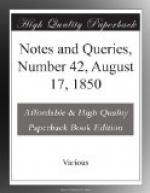1. How far back can the word alarum be traced in our language, and how far back alarm?
2. Can it be ascertained whether the French took alarme from our alarm, or we alarm from them?
3. Can any explanation be given of alarum, supposing it to be the original word? Is it a word imitative of sound?
A l’arme, instead of aux armes, adds to the suspiciousness of this derivation.
CH.
* * * * *
REPLIES.
SHAKSPEARE’S USE OF “DELIGHTED.”
Although Dr. Kennedy does not think I have discovered the source from whence Shakspeare’s word delighted is derived, I am gratified to find that he concurs with me in drawing a distinction between this and the more common word. His failure to convince me is a source almost of regret, so happy do I regard the derivation he proposes in the last passage cited. But in the passage from Measure for Measure, it does not appear to me to express the sense which I deduce from the context; and as I look upon the word in question as the same in each of the three passages, I feel more inclined to adhere to my view, that it is a word of English manufacture, according to the analogy referred to. I express my opinion with hesitation and there can be no doubt the question is deserving of full and attentive consideration.
Strengthened, however, in my main purpose, which was to show that Shakspeare did not use delighted in the ordinary sense of highly gratified, I am better prepared to meet MR. HALLIWELL. This gentleman does me no more than justice in the remark, not expressed, though, I hope, implied, that I would not knowingly make use of an offensive expression towards him or any living man; and I appreciate the courtesy with which he has sweetened the uncomplimentary things he has felt constrained to say of me. I trust it will be found that I can repay his courtesy and imitate his forbearance. As a preliminary remark, however, I must say that MR. HALLIWELL, in his haste, has confounded the “cool impertinence” for which I censured one editor, with the “cool correction” which was made by another; and, moreover, has referred the remark to Measure for Measure, which I applied to the notes to the passage in Othello. As I have not yet learned to regard the term “delightful” as an active participle, it is evident that, however “cool” I may consider the correction, I have not called it an “impertinence.” But he has no mind that I should escape so easily; and therefore, like a true knight-errant, he adopts the cause without hesitation, as though to be first satisfied of its goodness would be quite inconsistent in its champion.




